Which book is the first among equals?
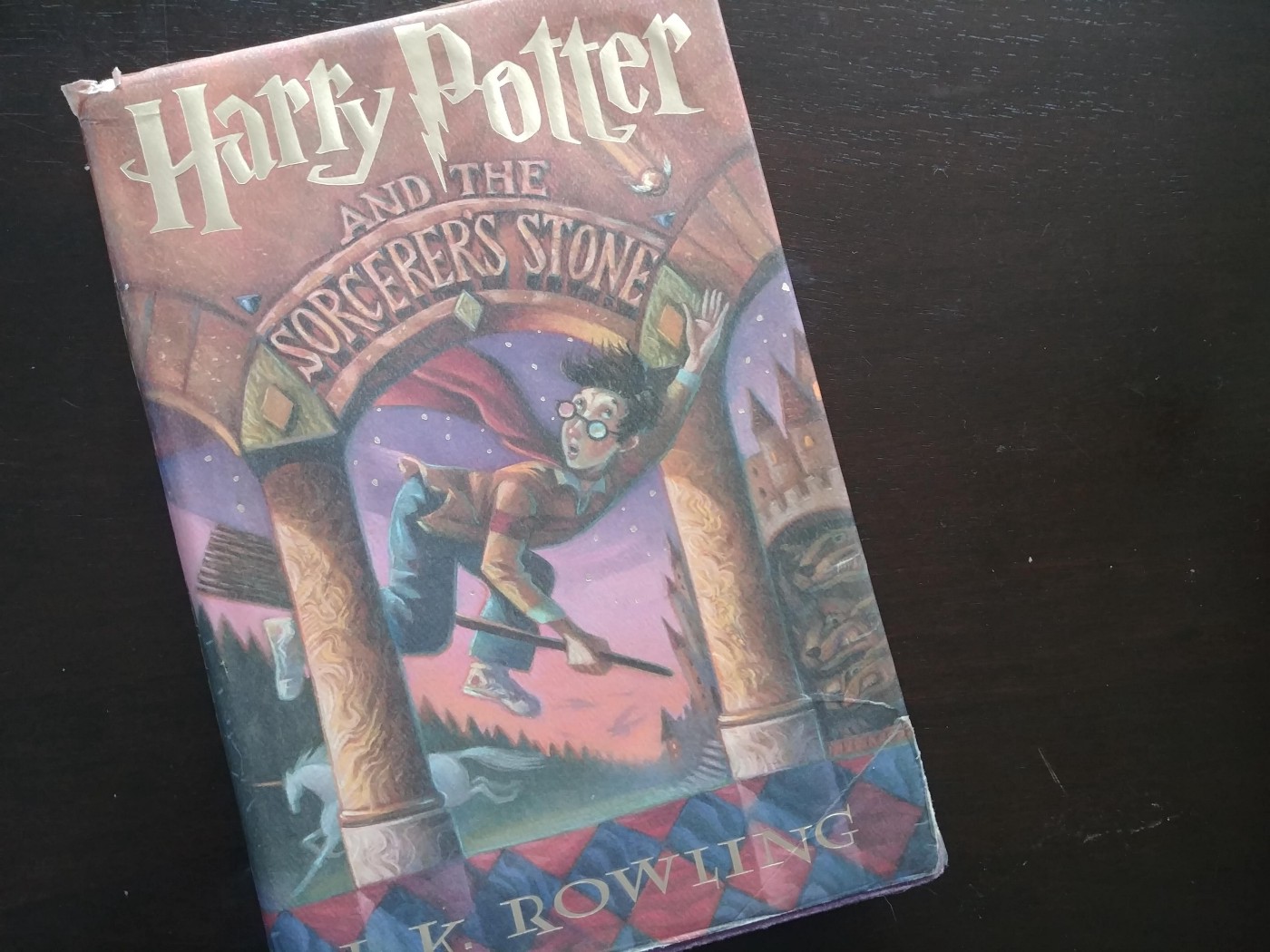
It is absolutely brutal ranking this one dead last. Seriously, I love this book.
Let?s start with what?s great about it.
This book does a lot with a little. It?s the shortest book, but it sets up the world, gives us a compelling backstory, and manages to fit in a great mystery with a surprising twist.
Our introduction to Harry is both heartbreaking and iconic. His treatment by the Dursleys is just so unfair that our sympathy is awakened right away.
J.K. Rowling even does an amazing job of setting up the book?s major exposition dump (Hagrid telling Harry who he really is). Exposition dumps are usually boring sections where readers lose interest, but this book is different. Rowling makes us wait for the exposition as Harry?s attempts to secure a letter are constantly thwarted by Uncle Vernon. By the time Hagrid comes along we are practically begging for the exposition dump.
This book also has a lot of really wonderful moments. I particularly love chapter 10: Halloween. In this chapter Hermione shows Ron up in charms by performing the levitating charm Wingardium Leviosa correctly. Ron insults her afterward, but she overhears and is distraught. When Harry and Ron realize Hermione doesn?t know about the troll running loose in the castle, they go to save her. Harry displays his characteristic willingness to rush in when someone is in danger and ends up shoving his wand up the troll?s nose. Ron ends up knocking out the troll with the very Wingardium Leviosa spell he just learned from Hermione. Hermione lies to a teacher to cover for Harry and Ron, and J.K. Rowling concludes this wonderful chapter with this gem:
But from that moment on, Hermione Granger became their friend. There are some things you can?t share without ending up liking each other, and knocking out a twelve-foot mountain troll is one of them.
It?s tough to believe that it takes more than halfway through the first book before Hermione becomes friends with Harry and Ron, but this book had a lot of setup to get through. The Halloween chapter happens much later than you?d expect given the fact that the book covers one school year.
Another moment that gets me every time is Neville winning the house cup for Gryffindor:
Someone standing outside the Great Hall might well have thought some sort of explosion had taken place, so loud was the noise that erupted from the Gryffindor table. Harry, Ron, and Hermione stood up to yell and cheer as Neville, white with shock, disappeared under a pile of people hugging him. He had never won so much as a point for Gryffindor before.
This book also has fantastic re-read value. It?s clear that J.K Rowling knew where this series was going from the beginning and planted seeds for later developments early on. So many statements are given new meaning in light of what happens in later books. For instance, here?s Dubledore?s answer when Harry asks why Voldemort tried to kill him:
?Alas, the first thing you ask me, I cannot tell you. Not today. Not now. You will know one day?put it from your mind for now Harry. When you are older?I know you hate to hear this?when you are ready, you will know.?
So why is this one last?
For one thing, the first two books suffer from the same issue: they?re too short.
But wait a minute, didn?t I just get done praising this book for how it does more with less? Yes, and I actually think that this book is the perfect length. People wouldn?t want to pick up a young adult fantasy series if the first book were 800 pages. This book needed to be short and snappy enough to convince publishers to print it. It also needed to get the reader through to the end so that J.K. Rowling can prove that she?s a master story-teller. Mission accomplished as far as I?m concerned.
So in one sense, this book is the perfect length.
But because it?s so good we would have gladly taken another 100?200 pages. You might say it?s unfair that I?m penalizing a book for being the right length, but after reading the longer books in the series the lesson is clear: more Harry is better.
Also, you have to remember that I?m not grading these books in a vacuum, I?m ranking them against each other. In a vacuum, I can say that this book was the perfect length. Bring the other books into the picture, however, and I?ll take one of the longer ones.
Another issue with both of the earlier books is that they lack the depth of later installments. Harry is young and innocent in these volumes and the conflict that he is entering into is complicated. He has to grow into an understanding of the impact of the struggles around him.
Again, that?s not a bad thing. It would be weird if 11-year-old Harry had the emotional depth and understanding of a fully grown wizard. But the Harry of subsequent books is a far more interesting character.
The other thing that holds this book back is the fact that its central mystery is less layered than the other books. This is partly because the book itself is short and has a lot of set up to get through. In this book, Harry and the gang are pretty much on the right track all long with their interpretation of the clues. Their only real error was thinking Snape was the villain instead of Quirrell. This still makes for a great twist, but it doesn?t give you as much opportunity to puzzle through the evidence yourself.
6. Harry Potter and the Chamber of Secrets
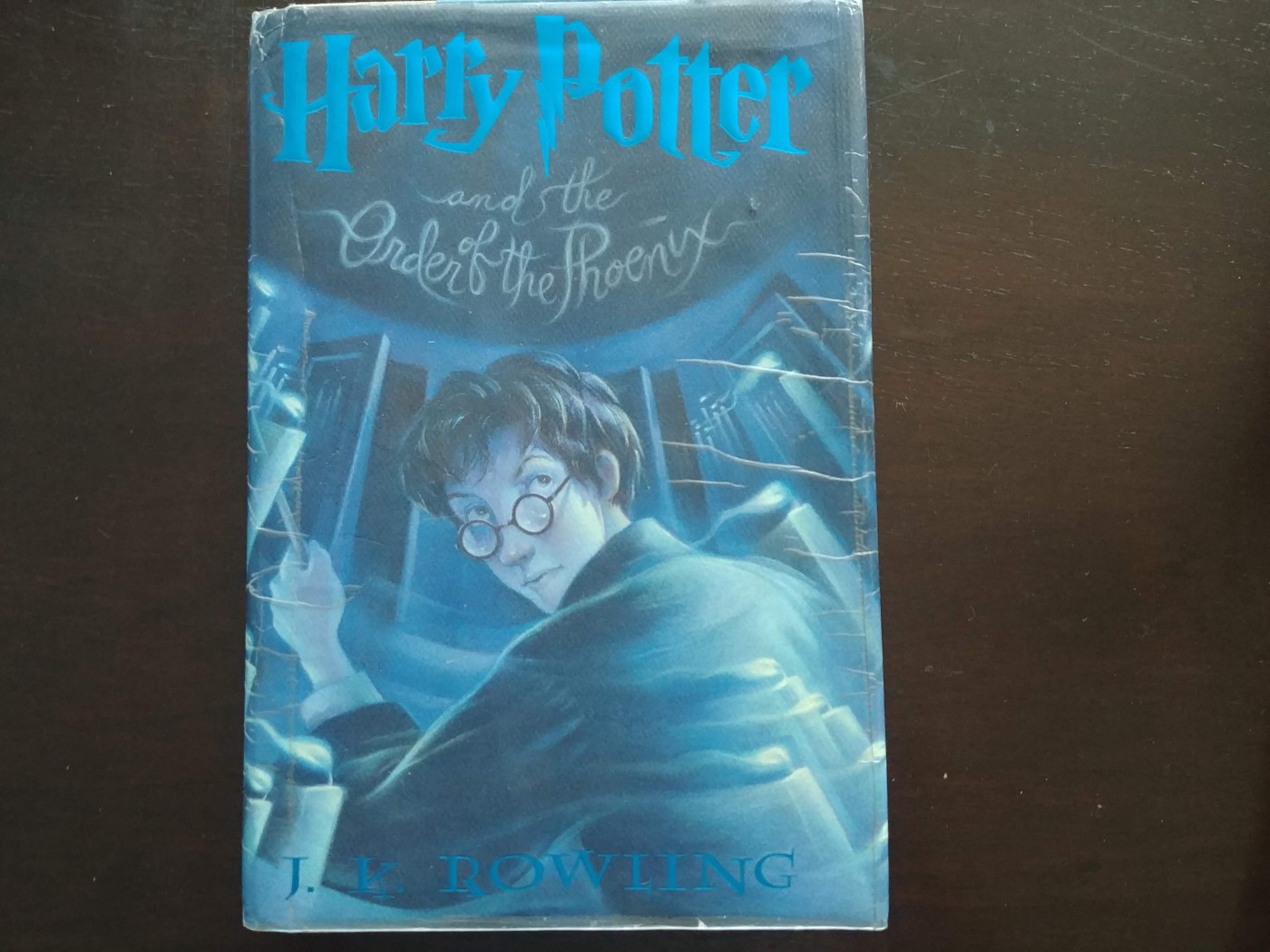
This is an amazing book. I could try to say something poetic and insightful about it, but instead I?ll just rely on this quote from Stephen King in Entertainment Weekly:
By the time finish The Order of the Phoenix with it?s extraordinary passages of fear and despair, the distinction between ?children?s literature? and plain old ?literature? has ceased to exist.
I mentioned that Chamber took a big step forward in terms of having Harry grapple with the possibility of the darkness within. Well, consider this passage from the very first chapter of Order:
Harry watched the dark figures cross the grass and wondered who they had been beating up tonight. Look round, Harry found himself thinking as he watched them. Come on?look round?I?m sitting here all alone?come and have a go?
If Dudley?s friends saw him sitting here, they would be sure to make a beeline for him, and what would Dudley do then? He wouldn?t want to lose face in front of the gang, but he?d be terrified of provoking Harry?It would be really fun to watch Dudley?s dilemma; to taunt him, watch him, with him powerless to respond?and if the others tried hitting Harry, Harry was ready ? he had his wand?let them try?He?d love to vent some of his frustration on the boys who had once made his life hell ?
But they did not turn around, they did not see him, they were almost at the railings. Harry mastered the impulse to call after them.
?Seeking a fight was not a smart move?He must not use magic?He would be risking expulsion again?
In one sense, this is a slight victory for Harry; he mastered the impulse to instigate a confrontation. And you can make lots of excuses for how he has some justification for wanting some payback against Dudley and his gang. But it?s hard to escape the obvious; Harry comes off as a bully here.
Harry will continue to struggle with the darkness within him for the whole book. Many times it?s because of his connection with Voldemort, but sometimes it seems to be his own anger and frustration.
Even though much of his frustration is justified, this book makes it clear more than any other: we are rooting for a flawed hero. And not just flawed in the ?has a saving people thing? way ? that?s like when in a job interview they ask you about your flaws and you say ?I work too hard, I care too much?? Harry has real flaws. He?s definitely our hero, but without the guidance of his mentors, the influence of his friends, and his own vigilance in fighting his inner battles, he is perilously close to descending down a dark path.
Of course, this book is also one of tremendous growth for Harry. With the help of Hermione, he takes up the mantle of the leader of the D.A.
In addition to being rich in character and thematic development, this book has some truly iconic moments. I?ll just mention two that hit very different emotional notes.
The first is when our trio runs into Neville as he visits his parents at St. Mungo?s. I?ll keep this brief because I?m already getting choked up just remembering it, but Neville pocketing the bubble gum wrapper his mom gave him has to be one of the most devestatingly sad things I?ve ever read.
Second (and much more triumphant) is Fred and George?s legendary escape from Hogwarts. This book needed a really fun moment and Umbridge desperately deserved to be taken down a peg. This scene accomplished both goals in a moment that makes you want to stand up and cheer.
The reason this book isn?t ranked higher comes down to this: Order is a book of frustrating futility.
Everything goes wrong in this book. The ministry turns against Harry. He?s kicked of the Quidditch team. His first relationship is a disaster. Hagrid has to flee. Dumbledore is ousted as Headmaster..
And of course Sirius?
I can?t even say it.
That?s not to say that this is a bad book because of those things. In fact, I would argue that it?s a better book because of those things. I would even say that the dark mood of books five and six is critical to the success of the series as a whole.
But since we?re ranking the books against each other, the ones that don?t feel like getting punched in the soul when you read them have a big advantage.
Tier 2: Optimistic Futility
4. Harry Potter and the Half-Blood Prince
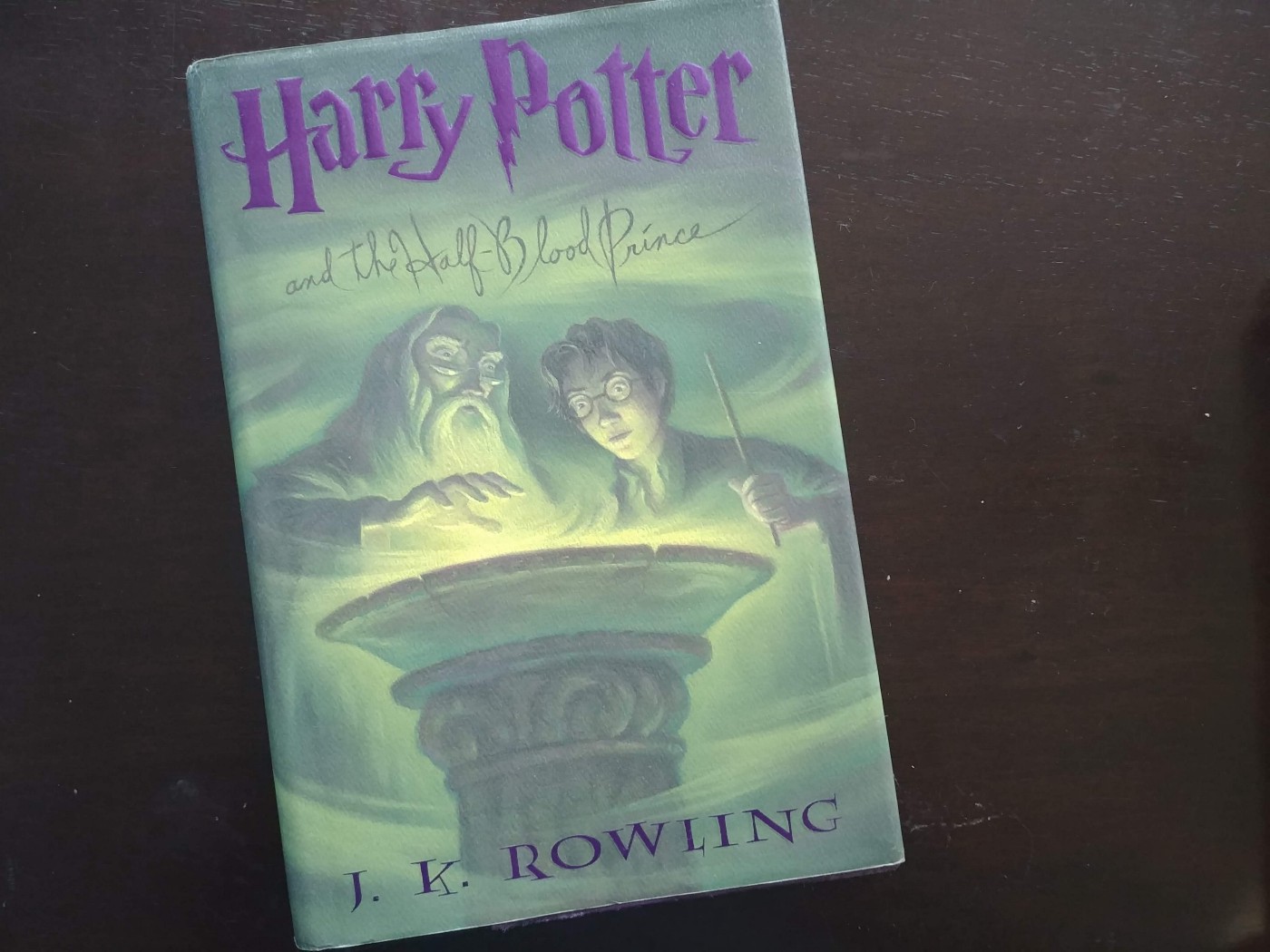
Like Order before it, Prince is in many ways a book of futility. Harry was right all along that Draco was up to something?but was unable to stop him. Death Eaters infiltrate Hogwarts. Bill is maimed. And Dumbledore?well, you know?
Harry and Dumbledore?s final mission, which proved so costly, doesn?t even result in them finding a Horcrux.
So on the surface, it seems like this belongs in the same tier as Order right? While you could certainly make that argument, let me give three reasons why I think that this book is slightly more optimistic (and therefore, slightly less frustrating) than Order:
Love that lasts
Yes, technically Harry and Ginny break up at the end of this book. Yes, Ron and Hermione end up hitting a rough patch in Hallows. But when these pairs finally get together, you understand that these characters are on to something more than a teenage fling.
Not only that, but the relationships are fun and funny. There are some sad moments, but Hermione going out with McLaggin to get backat Ron for dating Lavender is absolute gold.
A sense of direction
Here?s Harry in the last chapter of Order:
A few days ago, before his exams had finished and he had seen the vision Voldemort planted in his mind, he would have given almost anything for the Wizarding world to know he had been telling the truth, for them to believe that Voldemort was back and know that he was neither a liar nor mad. Now however?
Perhaps the reason he wanted to be alone was because he had felt isolated from everybody since his talk with Dumbledore. An invisible barrier separated him from the rest of the world. He was ? he had always been ? a marked man. It was just that he had never really understood what that meant?
The sun had fallen before he realized that he was cold. He got up and returned to the castle, wiping his face on his sleeve as he went.
Everyone finding out that Voldemort had come back was the silver lining of that book, but it feels like a hollow victory for Harry, who is crying by himself in front of the lake.
Here?s Harry in the last chapter of Prince:
?And then what?? said Ron.
?Then I?ve got to tack down the rest of the Horcruxes, haven?t I?? said Harry, his eyes upon Dubledore?s white tomb, reflected in the water on the other side of the lake. ?That?s what he wanted me to do, that?s why he told me all about them. If Dumbledore was right ? and I?m sure he was ? there are still four of them out there. I?ve got to find them and destroy them, and then I?ve got to go after the seventh bit of Voldemort?s soul, the bit that?s still in his body, and I?m the one who?s going to kill him.?
And here?s the last paragraph of the book:
His hand closed automatically around the fake Horcux, but in spite of everything, in spite of the dark and twisted path he saw stretching ahead for himself, in spite of the final meeting with Voldemort he knew must come, whether in a month, in a year, or in ten, he felt his heart lift at the thought that there was still one last golden day of peace left to enjoy with Ron and Hermione.
Yes, the path in front of him is ?dark and twisted??but at least he sees a path. Real progress was made in Prince: they found out about the Hallows and correctly guessed what several of them were. Harry has a clear-cut purpose and mission for the next book.
A sense of agency
Here?s what Harry thinks about the prophecy in the final chapter of Order:
?it was still very hard to believe as he sat here that his life must include, or end in, murder?
As it happens, he?s wrong about that; ultimately he triumphs over Voldemort without needing to murder him.
In any case, the existence of the prophecy is interesting for a series that emphasizes the importance of choice (think about Dubledore?s famous line from Chamber: ?It is our choices, Harry, that show what we truly are, far more than our abilities.?)
Now contrast Harry?s perception of the prophecy from Order with this one from Prince:
?You see, the prophecy does not mean you have to do anything! But the prophecy caused Lord Voldemort to mark you as his equal?In other words, you are free to choose your own way, quite free to turn your back on the prophecy! But Lord Voldemort continues to set store by the prophecy. He will continue to hunt you?which makes it certain, really that ? ?
?That one of us is going to end up killing the other,? said Harry. ?Yes.?
But he understood at last what Dumbledore had been trying to tell him. It was, he thought, the difference between being dragged into an arena to face a battle to the death and walking into the arena with your head held high. Some people, perhaps, would say that there was little to choose between the two ways, but Dumbledore knew ? and so do I, thought Harry, with a rush of fierce pride, and so did my parents ? that there was all the difference in the world.
In the original hearing of the prophecy, it seemed like the only choice belonged to Voldemort: Harry or Neville. But of course, there?s always a choice. Harry could give up and the prophecy would be fulfilled when Voldemort finally gets to him. That would be making a choice. But his choice to fight is not compelled by the prophecy, it?s his choice.
For me it?s hard to say if the darkest hour for Harry is the ending of Order or Prince. But either way, Prince finds a beautiful way of pairing one of the darkest moments in the series with a note of optimism. A light at the end of the tunnel. For me, that?s enough to make it come out ahead.
Tier 1: The Best of the Best
3. Harry Potter and the Goblet of Fire
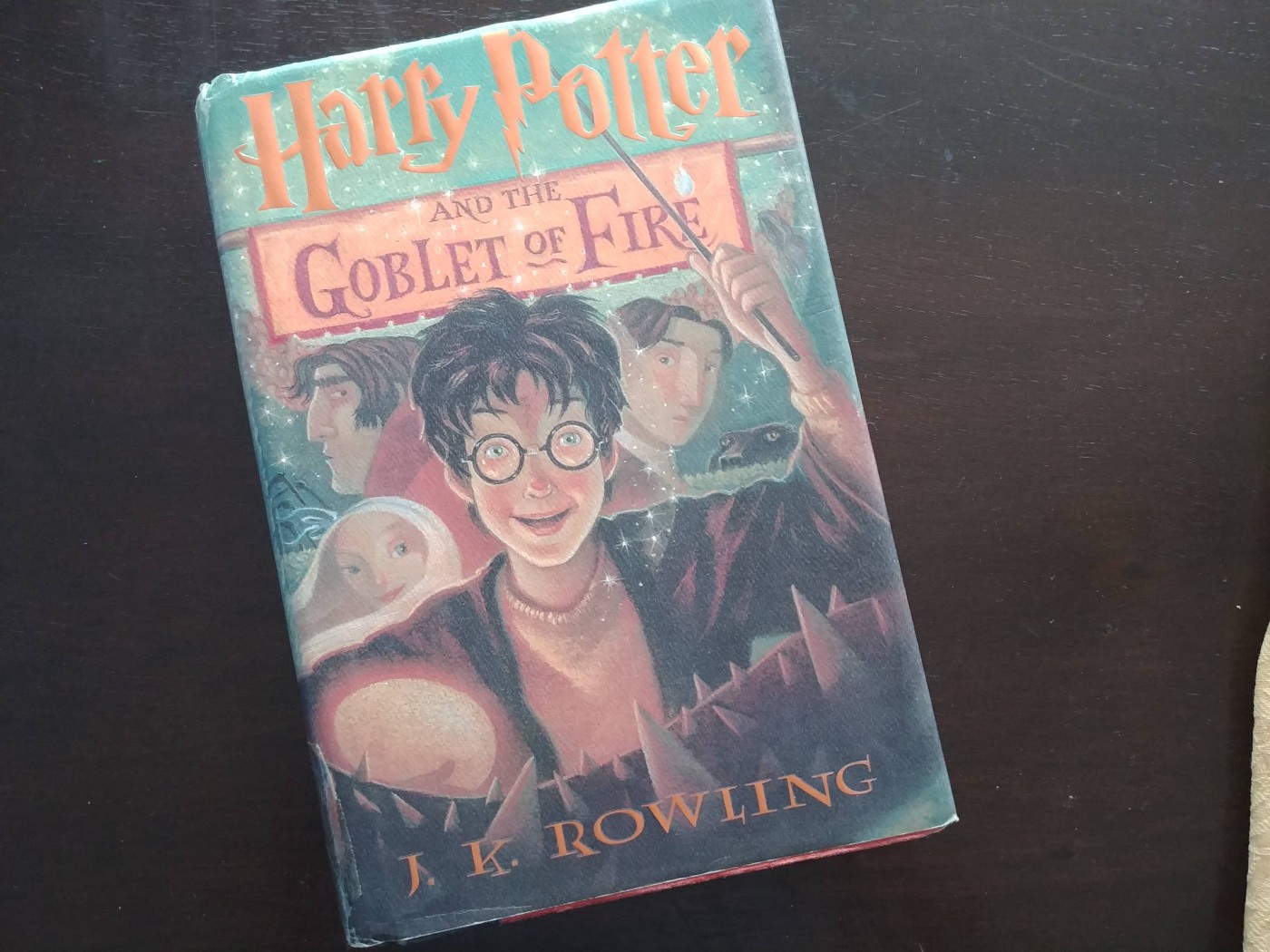
I think for many people, Goblet is where the series really begins. It?s the first of the massive volumes and the one actually ushers in the second war against Voldemort , the struggle at the center of the entire series.
The book starts with an intriguing change of pace. After nearly three straight books of only getting Harry?s perspective, we get a glimpse of something that is happening somewhere else. We have a chapter from the perspective of a Muggle, Frank Bryce. We learn more of Voldemort?s backstory, get a few glimpses into his plans, meet his snake Nagini, and discover, to our astonishment, that he has taken some sort of physical form again. It?s an ominous start to a novel that ultimately has an unsettling finish.
This volume gives us arguably the biggest expansion of the Wizarding world of any of the books. The quidditch world cup, leprechauns, leprechaun gold, veelas, the triwizard tournament, Beaubatons and Durmstrang, the Yule ball, the unforgiveable curses, priori incantatum, and veritaserum.
But as much as the new stuff makes for a refreshing change of pace from the usual cadence of life at Hogwarts, the real reason this book ranks so highly is because the mystery is the best out of any of the books.
It?s a classic whodunnit: Was it Barty Crouch? Ludo Bagman? Mad-Eye Moody? Ygor Karkaroff? Someone else?
Part of what makes the mystery work is the fact that a wrong assumption is made very early on and goes unchallenged. The characters and readers alike take it for granted that whoever put Harry?s name in the Goblet is hoping he?ll die in the tournament.
Moody may be automatically suspicious as a new character, but the fact that he appears to be helping Harry is a major reason why we trust him.
There?s also the fact that Barty Crouch Jr. is incorrectly assumed to be dead, something we learn from the ultimately unreliable source of Sirius Black. In fact, Sirius is the one who gave us the wrong assumption that someone was hoping Harry would die in the tournament. Tough look for my guy Sirius (shouts to Jason Concepcion of Binge Mode for the ?tough look for my guy? bit).
One final point in Goblet?s favor: the insane climax. When I was taking literature classes in High School, we were taught that a work of fiction consisted mostly of rising action. The climax was a very brief point in the story where tension was the highest and the end game comes into view or the solution is revealed. Clearly the literary critics who come up with these definitions have never read a Harry Potter book. If I had to identify the climax of this book, I would say that it starts on page 621 of the U.S. hard back version when Harry enters the maze and stretches all the way to page 691 where Barty Crouch Jr.?s confession ends. That?s 70 pages of non-stop, breathless action where tension is ratcheted up to the max. The first time you read this book, it didn?t matter how close to bedtime it was when you got to page 621, you finished the book that night.
2. Harry Potter and the Deathly Hallows
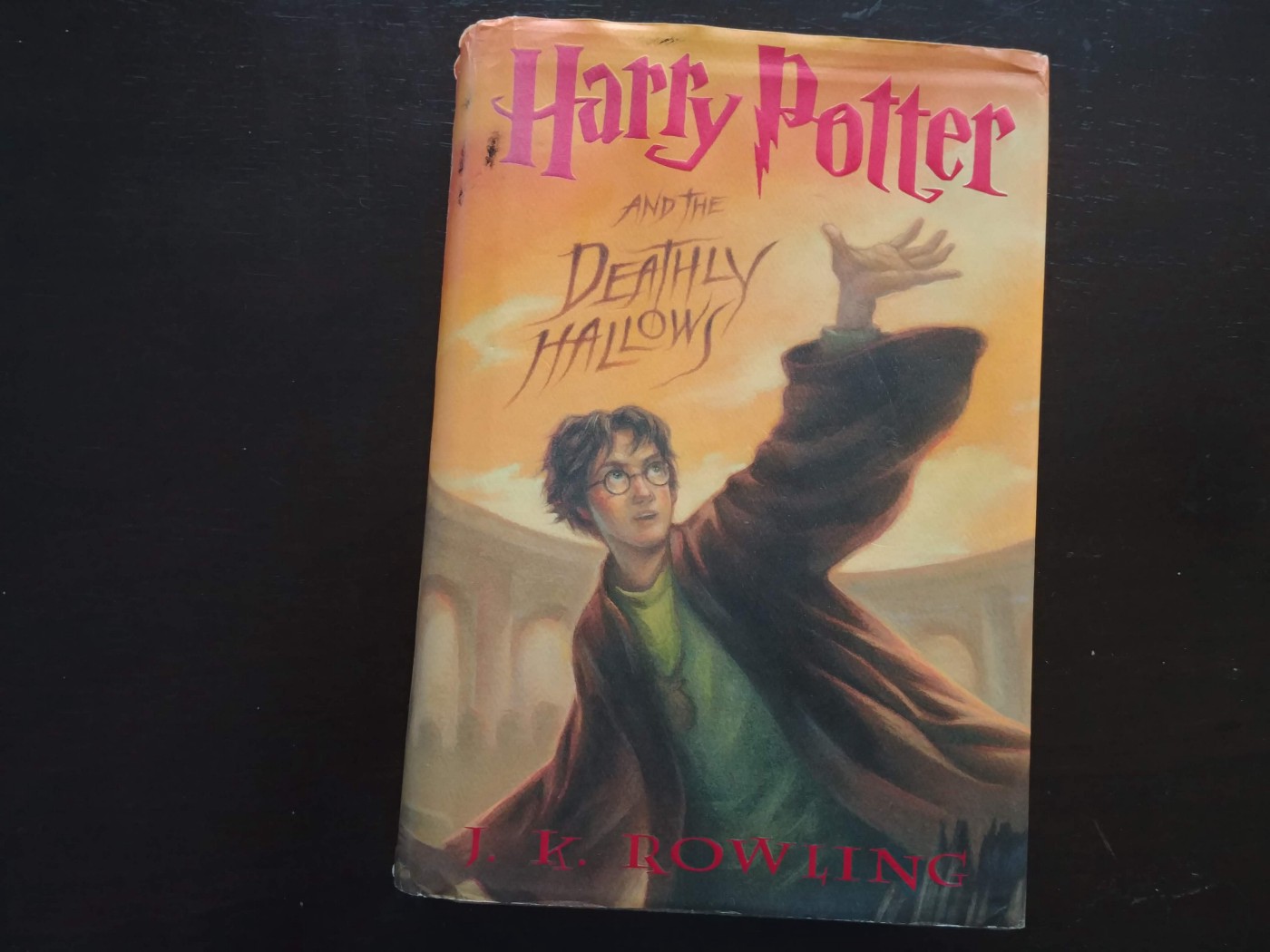
This book did the impossible: It lived up to my outrageous, unrealistic expectations.
Of course, I had my doubts early on.
When I first learned that the last Harry Potter book would clock in at under 800 pages, I worried that J.K. Rowling wasn?t going to be able to cover all the ground necessary to wrap everything up.
My fears worsened when I found out the book was called Harry Potter and the Deathly Hallows. What the heck are the Deathly Hallows? How is J.K. Rowling going to introduce something new this late in the series, especially after she just introduced Horcruxes in the last book?
When I started reading the book, I immediately became uneasy when I saw most of Harry?s first chapter involved setting up a Dumbledore subplot ? and I really didn?t like where it was going.
But this was Harry Potter and every single book so far had a satisfying conclusion. I was still expecting an ending of epic proportions.
My faith was rewarded. In hindsight, I?m ashamed there was ever a doubt.
This book is the most action packed of the whole series. Between infiltrating the Ministry of Magic, Robbing Gringotts, and the Battle of Hogwarts, this book has enough epic set pieces to serve as the climaxes for three separate books. Lets not forget that Harry narrowly escaped Voldemort near the beginning of the book (RIP Hedwig), the trio is attacked by Death Eaters on Tottenham Court Road, Harry is attacked by Nagini in Godric?s Hollow, Ron saves Harry from drowning when the Horcrux nearly suffocates him, and Dobby narrowly rescues our heroes from Malfoy Manor (RIP Dobby ?).
Goblet had a lot of action thanks to three Triwizard tasks and a breathless climax, but it looks tame compared to Hallows.
This book also really shines in terms of how satisfying the conclusion is. Harry follows in his mother?s footsteps and sacrifices himself to save everyone else. He gives Voldemort a chance for remorse. Voldemort is killed by his own rebounding spell while Harry goes for self defense.
In a shocking moment that has been developing since the first book, Neville destroys the final Horcrux.
This book takes a greater emotional toll than any of the other books. One explanation is simply because there are more deaths of significant characters in this installment than any other. While the number of major deaths is certainly a part of it, I would argue that the most devastating death in the entire series (yes, even more so than Sirius or Dumbledore), happens in this book.
I?m talking of course about the death of Dobby. He was a character that was just too good, innocent, and pure. He never acted selfishly, he just wanted to help Harry. Although his interventions were sometimes misguided, he was always incredibly sincere. At the point in the book where he dies, the plot has picked up the pace and you can tell that we are getting to the end game. It should be a time when it?s hard to put the book down. But the first time I read it I had to put the book down and sit with my emotions for a while.
This book could easily be number one. But I?ve always had a soft spot in my heart for?
1. Harry Potter and the Prisoner of Azkaban
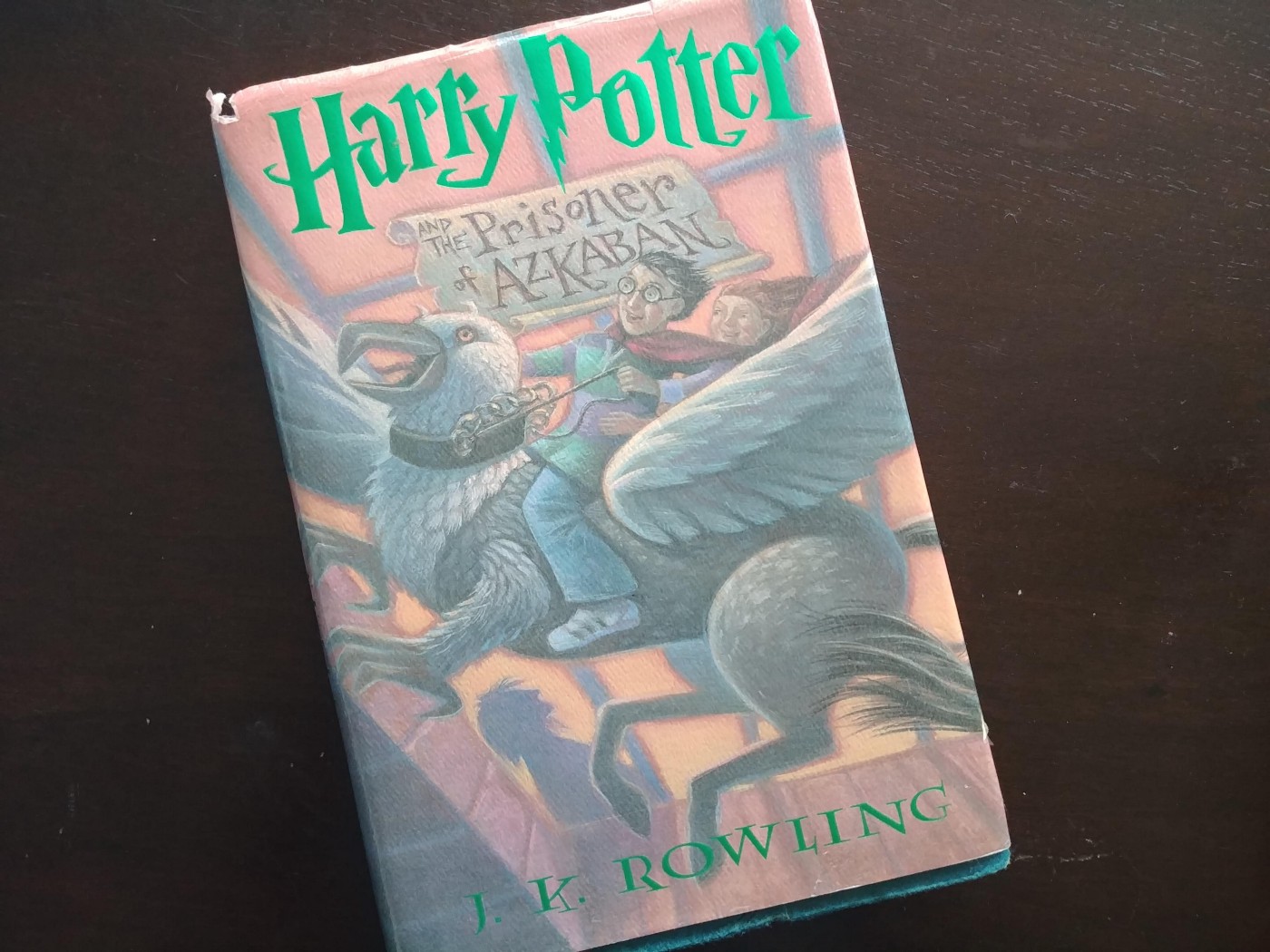
I mentioned that Hallows has the distinction of living up to my enormous expectations. Prisoner has the advantage of completely blowing away my expectations.
To be fair, my expectations were probably lower for this book than any but the first. I read this book for the first time late in the year 2000. At the time only the first four books were out. My sister had given me her copy of the first when she didn?t like it and I checked out the second from the school library a few days later. As soon as I finished that one, I convinced my mom to let me buy the third and fourth books online (and I really had to convince her ? these books were the very first things we ever bought on the internet and she was scared her identity would be stolen).
So there I was, having just finished the first two books and I had the third and fourth arrive on my doorstep. I quickly read the inside of the jacket of both books ? and was very disappointed with what I read in Prisoner. The first two books had intriguing mysteries baked into the titles: What is the Sorcerer’s Stone? Why is it important? What is the Chamber of Secrets? Where is it? The inside of the jacket not only told us who the prisoner of Azkaban was, it told us what he was imprisoned for, who he served, and what his goals were. Talk about a let down, where?s the mystery?
There was also the fact that had this beautiful 734 page book just waiting for me. I couldn?t wait to get through Prisoner so I could get to Goblet.
That attitude would change.
I?m not sure when I first realized that this book was special. It might have been when Harry blew up Aunt Marge. Not only was it satisfying to see her get what she deserved, but it was such an interesting choice on J.K Rowling?s part to force Harry to deal with the consequences, fleeing the house with nowhere to go and no plan. I seriously didn?t see it coming or know where it would lead.
The dementor chapter was another clue that this book was something special. You could relate so painfully to Harry. It?s brutal to be the only one to struggle with a challenge. And fear is an issue that we all have to confront sooner or later.
As the plot developed it turned out there were some mysteries to resolve. How was Sirius Black breaking into Hogwarts undetected? Did he have help? Who sent Harry the Firebolt?
Also, the side plots became more developed than any other book. The Buckbeak story was great. I loved the way it tied in with the main story at the end. I loved the way that it gave us reason to sympathize with Hagrid and further loathe Malfoy.
This was a great book for the two consistent thorns in Harry?s side: Draco Malfoy and Severus Snape. The plot gives Malfoy something to do besides taunt Harry as he tries to get Buckbeak executed. Snape gets developed through his distrust of Lupin and history with James.
It was nice to have a major character introduced who didn?t immediately annoy you (*ahem* Lockhart, Umbridge) and who didn?t turn out to be the villain (??Made-Eye? Moody? aka Barty Jr.). Professor Lupin is a great character and it?s really nice for Harry to have a mentor outside of the end of term downloads he gets with Dumbledore. It?s also suspenseful, because as much as we like and trust Lupin, there is a fear that he might actually be the one helping Sirius Black.
It?s tough to put into words some of what I like about Prisoner. It just seems sort of, well?magical. Whether its Harry getting to live alone at the Leaky Cauldron for a few weeks, the visits to Hogsmeade, the sneaking around in secret passages, the presence of a haunted house, or the marauders map, this book just seems to have everything you could want from an enchanting fantasy story.
I also really like the Patronuses. The dementors are a bit of a dark addition to the story, but the Patronus is the perfect counter-balance. They almost work like a little mini life lesson: to combat fear and despair you need to lean on your inner strength. This inner strength is not entirely your own, though you owe much of it to the people who have loved you. I?ve always thought this line was so beautiful:
?You think the dead we loved ever truly leave us? You think that we don?t recall them more clearly than ever in times of great trouble? Your father is alive in you, Harry, and shows himself most plainly when you have need of him. How else could you produce that particular Patronus? Prongs rode again last night.?
As much as the Patronuses provide us with that feel-good moment, it?s worth noting that this is the first book with a bit of a dark edge to it. I don?t just mean the dementors. This is the first book where you can make a case that the good guys lost, and it starts a streak of four straight books that can be chalked up as losses for our heroes. Yes, Harry, Ron, and Hermione uncover the truth and save Sirius Black, but Peter Pettigrew gets away. When you pair that with Trelawney?s prophecy that Voldemort?s servant would escape that night and help him return as well as the fact that they couldn?t prove that Sirius was innocent, and it sure seems like a grim defeat.
In fact, Harry even struggles with this issue in his conversation with Dumbledore. Harry made the difficult decision to spare Pettigrew, but he had to live with the consequence of his choice which allowed Pettigrew to escape.
When I make the case for why this book is #1 for me, two things really stand out:
The most unique climax I?ve ever seen
We get one of the more ominous moments in the book (even the entire series) when Trelawny goes into a trance during Harry?s divination exam and prophesies Voldemort?s return.
Immediately after this spine-tingling scene, a crazy sequence of events unfolds. Hagrid sends a letter saying Buckbeak lost his appeal. The trio goes to seem him ? and finds Scabbers. Buckbeak is apparently executed. Scabbers and Ron are taken through the passage under the Whomping Willow by the black dog Harry has been seeing. And Harry and Hermione follow to come face-to-face with Sirius Black in the shrieking shack.
This is the scene where the solution is revealed and? it?is?stunning. It?s amazing that J.K. Rowling can keep our attention arrested this long with just characters talking, but she can. As the scene unfolds, it starts to seem like there?s a chance that Sirius is innocent, but we know that simply cannot be. JKR has some serious explaining to do to make everything fit. And then she ties up every loose end and it is masterful.
That?s good enough for a thrilling climax, but there is more. Lupin transforms, the dementors come, and Harry nearly loses his soul.
And we?re still not done.
Time travel is difficult to do well, but I thought it was expertly executed in this book. One amazing thing is that J.K. Rowling was creating new mysteries in one half of the climax ? such as who saved Harry, Hermione, and Sirius from the dementors ? and then solving them in the second half. Serious flex by our gal JKR
I mentioned that Goblet had a 70 page climax, but this one wins on page count. If you assume the climax starts at the beginning of chapter 17 (?Cat , Rat, and Dog ? starts on page 331 of the U.S. Hardback) and ends at the end of chapter 21 (?Hemione?s Secret? which ends on page 415 of the U.S. hardback), the climax spans five chapters and 83 pages. If anything, that?s conservative. I would argue that the climax actually starts with Trelawney?s prophecy on page 324, bringing our total page count up to 90. There are very few authors who can crank the intensity dial all the way up and sustain it for 90 pages.
The emotional impact
When the story starts, we don?t like Sirius Black. Anyone who actively serves Voldemort is not someone we want to associate with, and the fact that he seemingly wants to kill our hero makes things even worse.
Yet as low as our initial opinion of him was, it decreases orders of magnitude when we find out that he was James Potter?s best friend and betrayed him to Voldemort. So much of this series highlights the power of friendship and the value of laying down your life for your friends. In these books, selling your friends out might just as well be the ultimate sin.
When Harry confronts an unarmed Sirius, Sirius whispers ?Going to kill me, Harry??
At that point, it seems he might.
It?s something that J.K. Rowling planted in our heads early on and seems like it could be the central moral question of the book. Consider this passage from just after Harry learns that Sirius betrayed his parents to Voldemort:
?So what are you saying?? said Ron, looking very tense. ?You want to ? to kill black or something??
?Don?t be silly,? said Hermione is a panicky voice. ?Harry doesn?t want to kill anyone, do you, Harry??
Again, Harry didn?t answer. He didn?t know what he wanted to do. All he knew was the idea of doing nothing, while Black was at liberty, was almost more than he could stand.
Or this one from early in the confrontation with Sirius in the Shrieking Shack:
A boiling hate erupted in Harry?s chest, leaving no place for fear. For the first time in his life, he wanted his wand back in his hand, not to defend himself, but to attack?to kill.
As interesting as the ?is it justifiable to kill the villain?? dilemma is (and it?s one that I?ve loved in stories such as Return of the Jedi, The Dark Knight, Avatar: The Last Airbender, and Daredevil season 1), this book goes a level deeper. Not only does Harry not kill Sirius, he?s able to get past his anger to get to the truth and to embrace Sirius as a father figure. This line gives me goosebumps every time I read it:
?Believe me,? croaked Black. ?Believe me, Harry. I never betrayed James and Lilly. I would have died before I betrayed them.?
And at long last, Harry believed him. Throat too tight to speak, he nodded.
I mentioned earlier how initially I couldn?t wait to get done with Prisoner so I could start reading Goblet. Well, I finished Prisoner in one day. Not because I was rushing through it to get to the next book but because I couldn?t put it down. The next day, instead of starting on Goblet, I picked up Prisoner and started reading through it a second time.
As it stands, it?s probably the Harry Potter book that I?ve read the most. If you don?t count the bedtime stories I?ve read to my kids thousands of times, Prisoner might be the book that I?ve read the most ever.
I?ve read through it so many times that I broke the spine on my original copy:
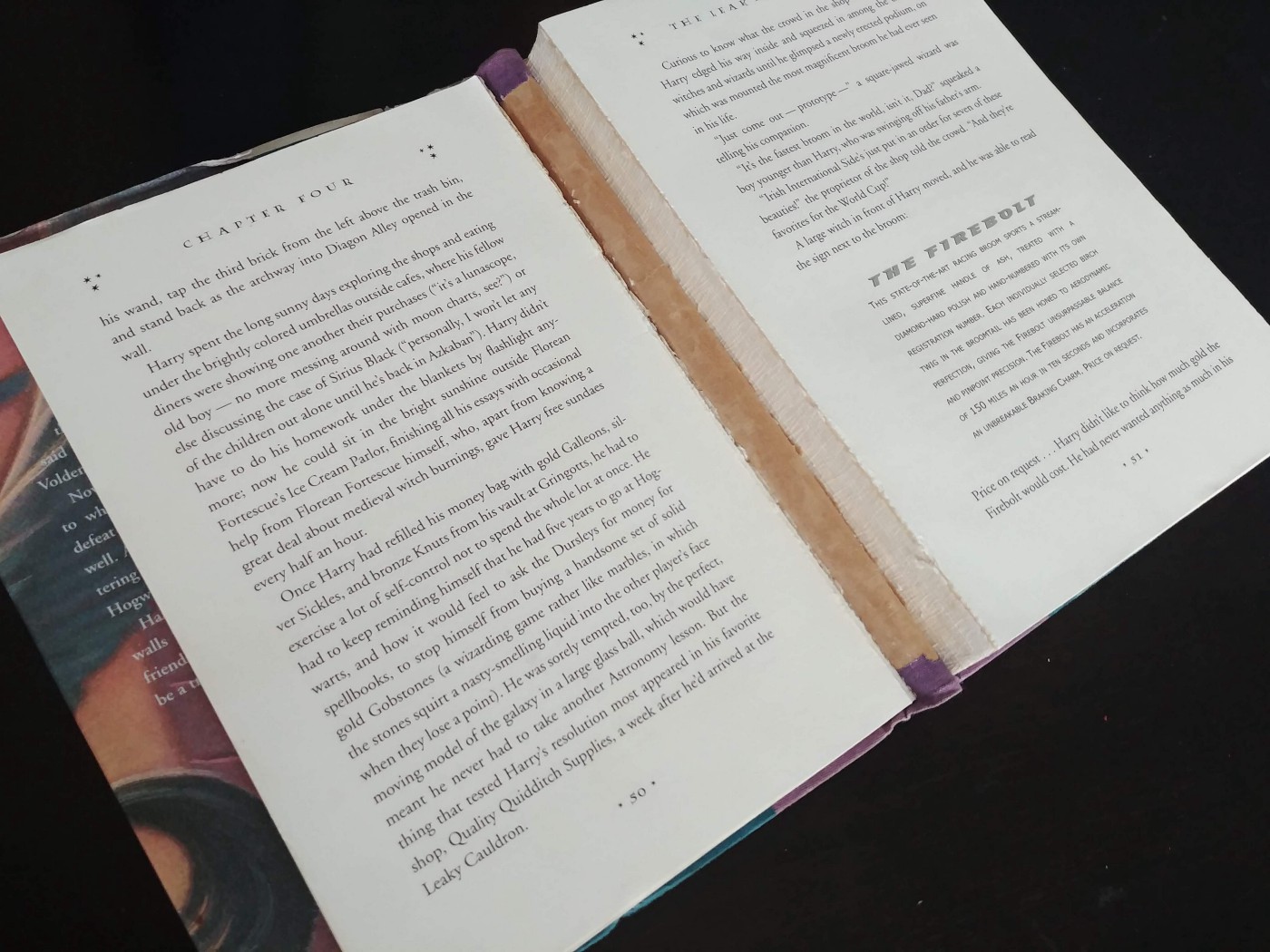
Prisoner is the book that I most wish I could forget reading so I could go and read it for the first time.
It?s hard for me to pick a favorite Harry Potter book, but if you made me do it, this would probably be the one.
How about you, which book is your favorite? Which is your least favorite? Do you agree with my list? Do you think I?m out of my mind and need to be set straight? Let me know.